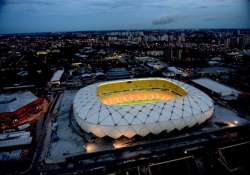Brazil inaugurates another World Cup stadium
SAO PAULO: Brazilian officials are inaugurating the Arena da Amazonia in the jungle city of Manaus, the ninth World Cup stadium to become available for football's showcase event. Three still have to be finished, including

SAO PAULO: Brazilian officials are inaugurating the Arena da Amazonia in the jungle city of Manaus, the ninth World Cup stadium to become available for football's showcase event. Three still have to be finished, including the one hosting the opener in Sao Paulo in about three months.
The Arena da Amazonia won't be fully completed on Sunday but local authorities are inaugurating the venue with a regional championship match that will have 20,000 people in attendance, including workers who helped to build the venue.
The 44,000-capacity stadium will host four World Cup matches in June, including England vs. Italy and United States vs. Portugal.
The Arena da Amazonia was one of six stadiums not completed by the end of last year as wanted by FIFA. It was expected to be inaugurated last month but the event had to be postponed because there was too much work left at the time.
Sunday's match between Nacional and Remo will be played as if it was a World Cup event from the organizational point of view.
"We have to put everything to work so we can immediately correct anything that goes wrong," said Amazonas state Gov. Omar Aziz, adding that two other test events are expected before the World Cup begins.
Only fans with tickets will be allowed inside a 1-kilometer (0.6-mile) perimeter near the stadium. In addition to the 13,000 tickets sold to the general public, 7,000 were given to stadium workers and their relatives.
More than 2,500 policemen will be working during the match, including 200 in charge of monitoring ticket scalpers outside the stadium and some 70 officers inside the venue working on the pitch and the stands.
The Arena da Amazonia cost nearly $290 million, about $70 million more than originally expected. The construction was marked by three workers' deaths, including a 55-year-old Portuguese man killed in an accident last month while disassembling a crane that was used to install the stadium's roof.
The city of Manaus made the headlines before the World Cup draw last year, when England coach Roy Hodgson said it was "the place ideally to avoid" because of the humid and steamy weather in the region, which is distant from the country's football centers. Local officials complained but the dispute has blown over and Hodgson received a warm welcome when he visited the city last month.
The Brazilian stadiums still under construction are the Itquerao in Sao Paulo, the Arena Pantanal in the wetlands city of Cuiaba and the Arena da Baixada in the southern city of Curitiba, which last month was nearly dropped as a host because of delays in the stadium.
Brazil is also struggling to finish infrastructure work around the venues in the 12 host cities, and local officials admit that not everything will be ready.
The Arena da Amazonia won't be fully completed on Sunday but local authorities are inaugurating the venue with a regional championship match that will have 20,000 people in attendance, including workers who helped to build the venue.
The 44,000-capacity stadium will host four World Cup matches in June, including England vs. Italy and United States vs. Portugal.
The Arena da Amazonia was one of six stadiums not completed by the end of last year as wanted by FIFA. It was expected to be inaugurated last month but the event had to be postponed because there was too much work left at the time.
Sunday's match between Nacional and Remo will be played as if it was a World Cup event from the organizational point of view.
"We have to put everything to work so we can immediately correct anything that goes wrong," said Amazonas state Gov. Omar Aziz, adding that two other test events are expected before the World Cup begins.
Only fans with tickets will be allowed inside a 1-kilometer (0.6-mile) perimeter near the stadium. In addition to the 13,000 tickets sold to the general public, 7,000 were given to stadium workers and their relatives.
More than 2,500 policemen will be working during the match, including 200 in charge of monitoring ticket scalpers outside the stadium and some 70 officers inside the venue working on the pitch and the stands.
The Arena da Amazonia cost nearly $290 million, about $70 million more than originally expected. The construction was marked by three workers' deaths, including a 55-year-old Portuguese man killed in an accident last month while disassembling a crane that was used to install the stadium's roof.
The city of Manaus made the headlines before the World Cup draw last year, when England coach Roy Hodgson said it was "the place ideally to avoid" because of the humid and steamy weather in the region, which is distant from the country's football centers. Local officials complained but the dispute has blown over and Hodgson received a warm welcome when he visited the city last month.
The Brazilian stadiums still under construction are the Itquerao in Sao Paulo, the Arena Pantanal in the wetlands city of Cuiaba and the Arena da Baixada in the southern city of Curitiba, which last month was nearly dropped as a host because of delays in the stadium.
Brazil is also struggling to finish infrastructure work around the venues in the 12 host cities, and local officials admit that not everything will be ready.